In an environment where opinions about the rise of AI (artificial intelligence) diverge wildly into disasters and utopias, we set out to offer a grounded perspective on what AI means to creatives and professionals today.
As creatives, researchers, and strategists ourselves, we wanted to understand how our peers are thinking about AI in business. Is this buzzy technology really that impactful? What is the evidence? We conducted in-depth interviews with researchers, strategists, marketers, and creatives in tech—from freelancers and junior prompt engineers to award-winning, established tech commentators—followed by a survey of over 500 professionals.
The result is an AI report which presents the nuanced reality under all the hype. This State of AI report is less concerned with opinions about the far-off future when nanobots heal all our infirmities or emerging AI technologies run for office. It captures concrete, day-to-day evidence about the myriad ways the current state of AI is changing everything (and where things seem pretty much the same).
We found that although 75 per cent of tech professionals use AI tools on a daily basis, less than 15 per cent are afraid it will replace them. In our report, we describe the differences in the use of enterprise artificial intelligence versus that of startups, explore democratizing effects of AI in 2023, and share what we learned about how professionals navigate risk and disclosure of AI adoption to clients. Our AI report also discusses the skills that will be most in demand in an AI-permeated future, from critical thinking to curation and creativity. Above all, creatives and tech professionals see the latest in AI as another tool in a growing arsenal rather than replacement for human ingenuity.
“AI hype is distinct from crypto because it is a tool, not a solution.”
Key findings from the 2023 State of AI in Tech report
- 88% of startup workers use AI tools
- 77% of professionals working in tech companies say AI is used with some frequency in their jobs
- 15% of tech company workers use AI nearly every day
- Those who use AI more frequently are less concerned and more optimistic about it
- A majority of creatives do not perceive AI as a threat to their job
- Those in creative roles report AI allows them to be more creative and innovative than non-creative roles
- AI is currently used to execute instead of strategize
- Despite ‘takeover’ fears, trained creatives find AI augments their abilities
- Those working in startups are more likely to disclose AI use compared to those working in established companies
- Critical thinking, problem solving, and creativity are top skills required for work in an AI dominated future
Download the full State of AI in 2023 report.
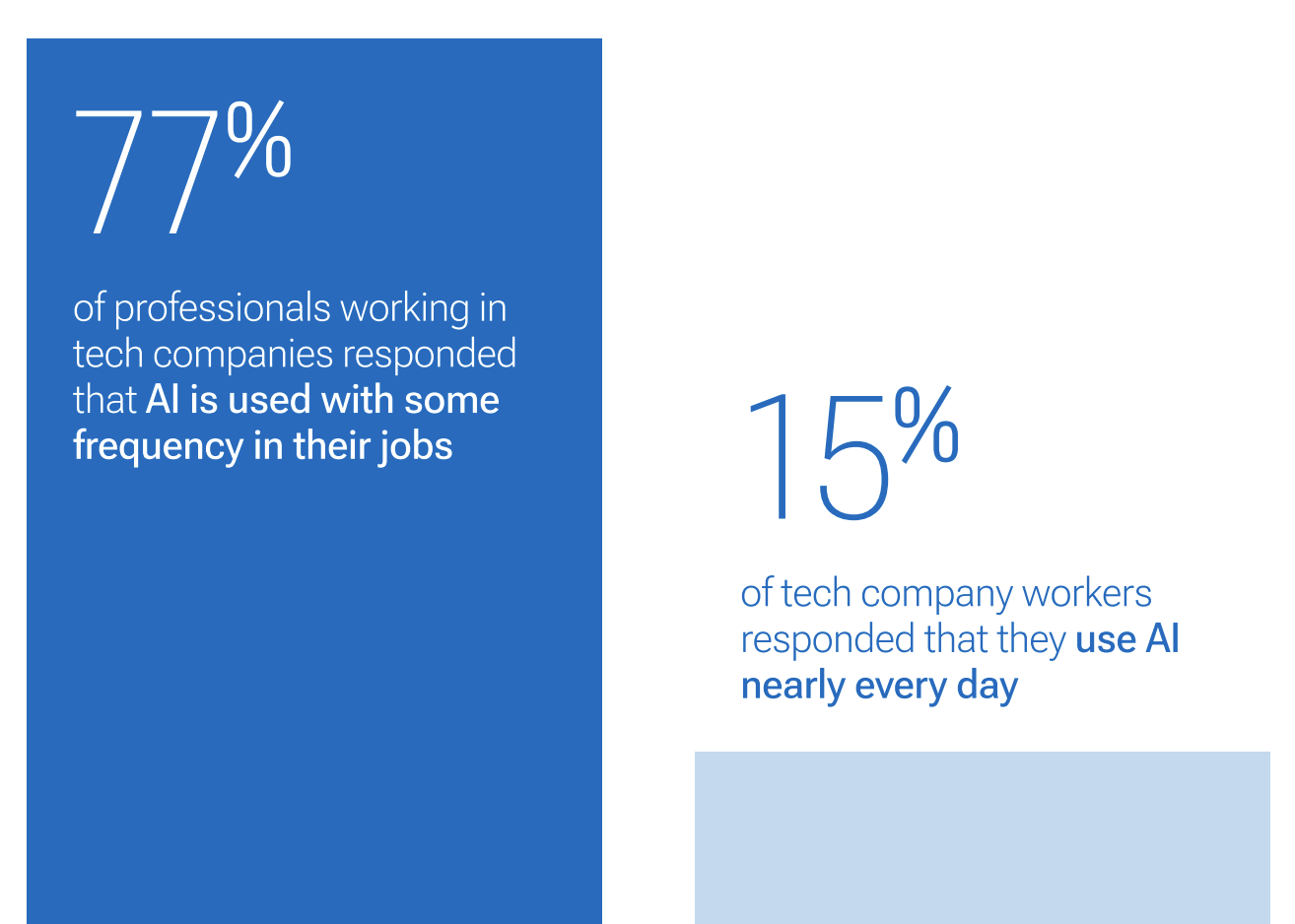
1. AI has changed tasks within jobs, but for many, roles remain the same
AI’s impact has yet to be seen relative to past historical transformations like the Industrial Revolution. Respondents indicated that current limitations may mean AI adoption will be dispersed across industries, but change will be difficult to perceive in the aggregate.
While 23 per cent of Canadian tech workers don’t use AI or even find it helpful in their day-to-day tasks, the majority of respondents that are using AI tools in some form also said the changes feel incremental. How tasks are done may be changing, but they have not yet seen substantive changes to their roles themselves. The exception may be entry-level positions, where repetitive tasks can be automated.
The potential is clear, but it remains to be seen whether or not its outputs will be acceptable to humans.
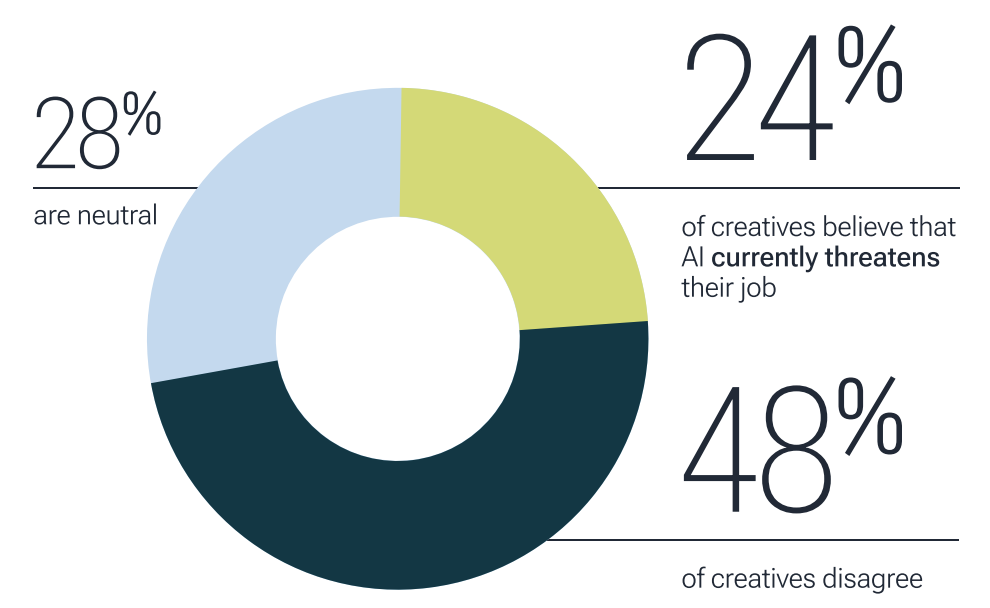
2. The majority of creatives do not perceive AI as a threat to their job
Tech employees working in sales and engineering are eager to integrate the tool into their roles, while workers with content creation functions express greater worry. Similarly, older workers may be less eager to embrace the new changes (and have fewer incentives, as their jobs require less future-proofing).
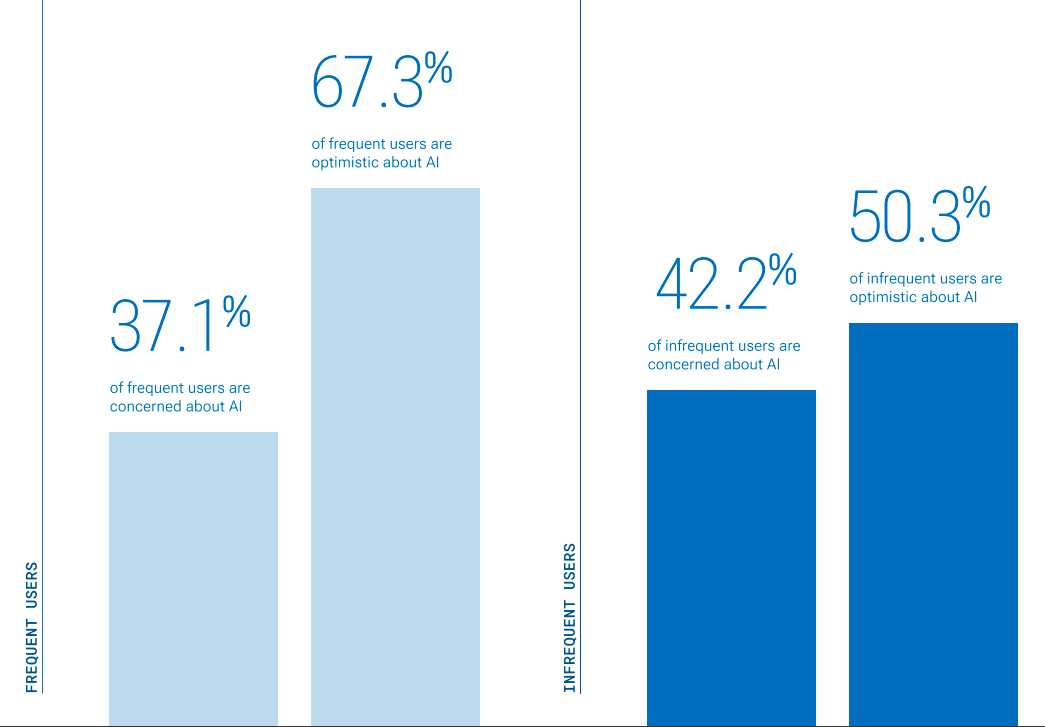
3. Frequent users of AI are less concerned about it
The more tech creatives use AI tools, the more optimistic they are about them. Conversely, infrequent users express more concerns about AI.
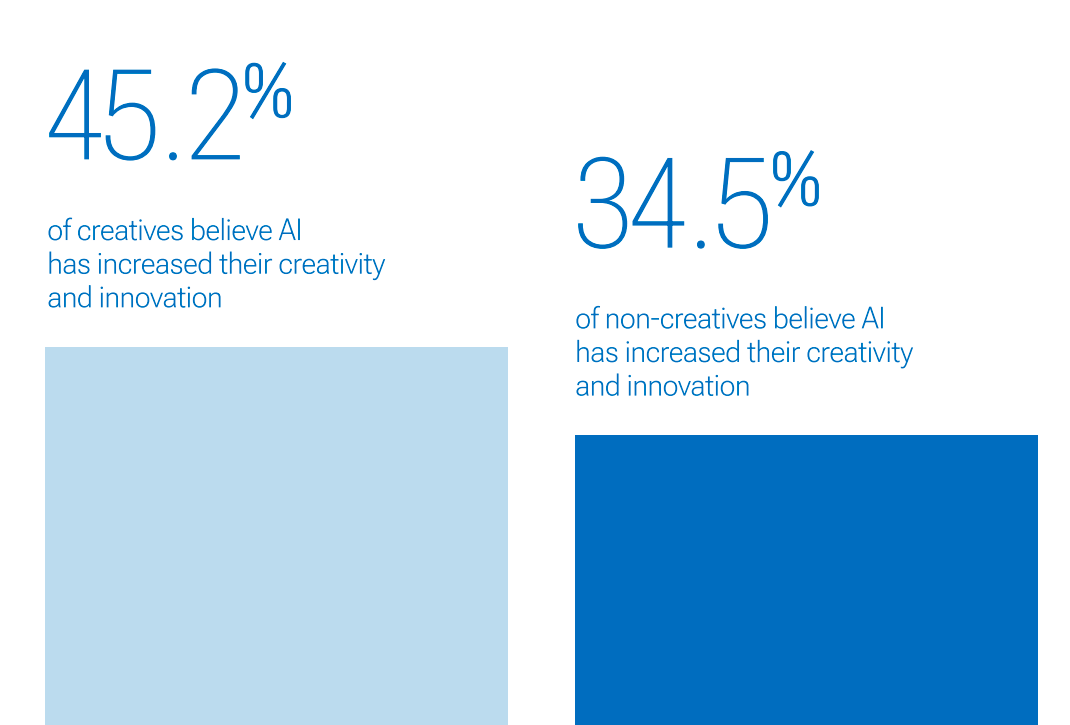
4. Those in creative roles report AI allows them to be more creative and innovative than non-creative roles
When asked “what has changed since you have started using AI in your work?,” those in creative roles agree that AI has increased more innovation and creativity in their lives by around 10 per cent.
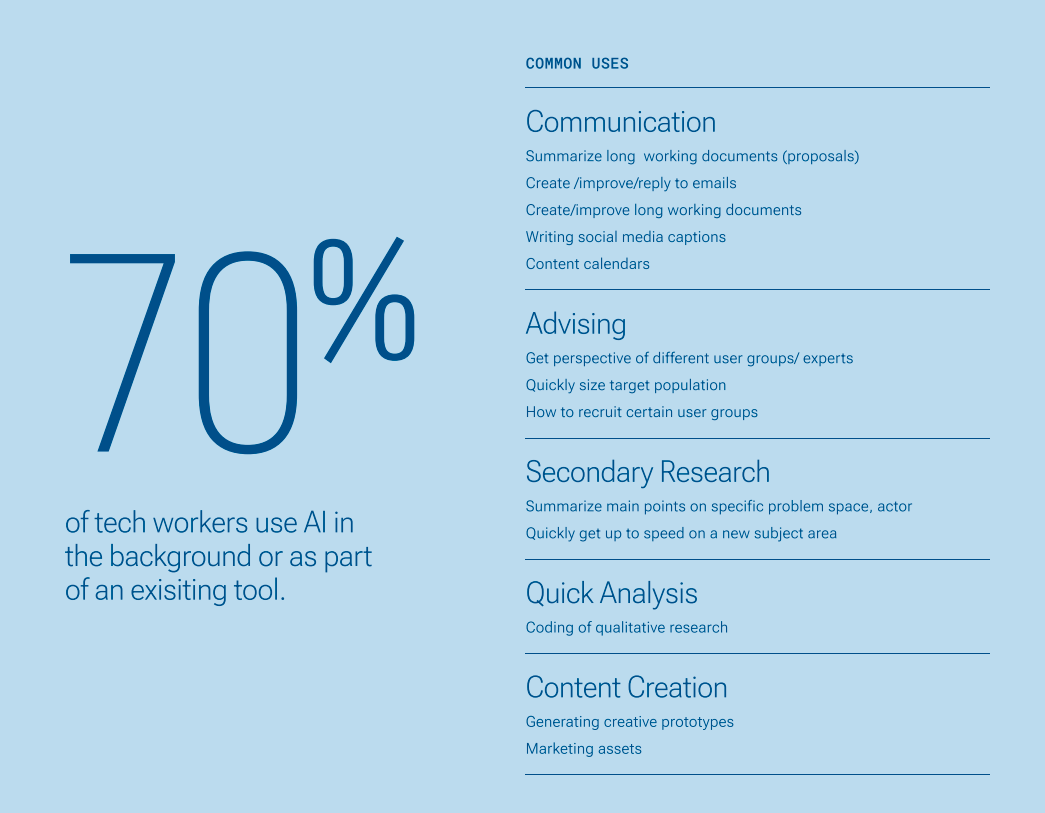
5. AI is currently used to execute instead of strategize
When it comes to the state of AI today, our respondents believe that AI is best used to execute repetitive tasks like research and data analysis, but humans are needed to move through complexity and solve ‘hard problems.’ The prevailing impression is this will have the biggest effect on ‘grey-collar’ workers: those who are relied on to execute a broader strategy.
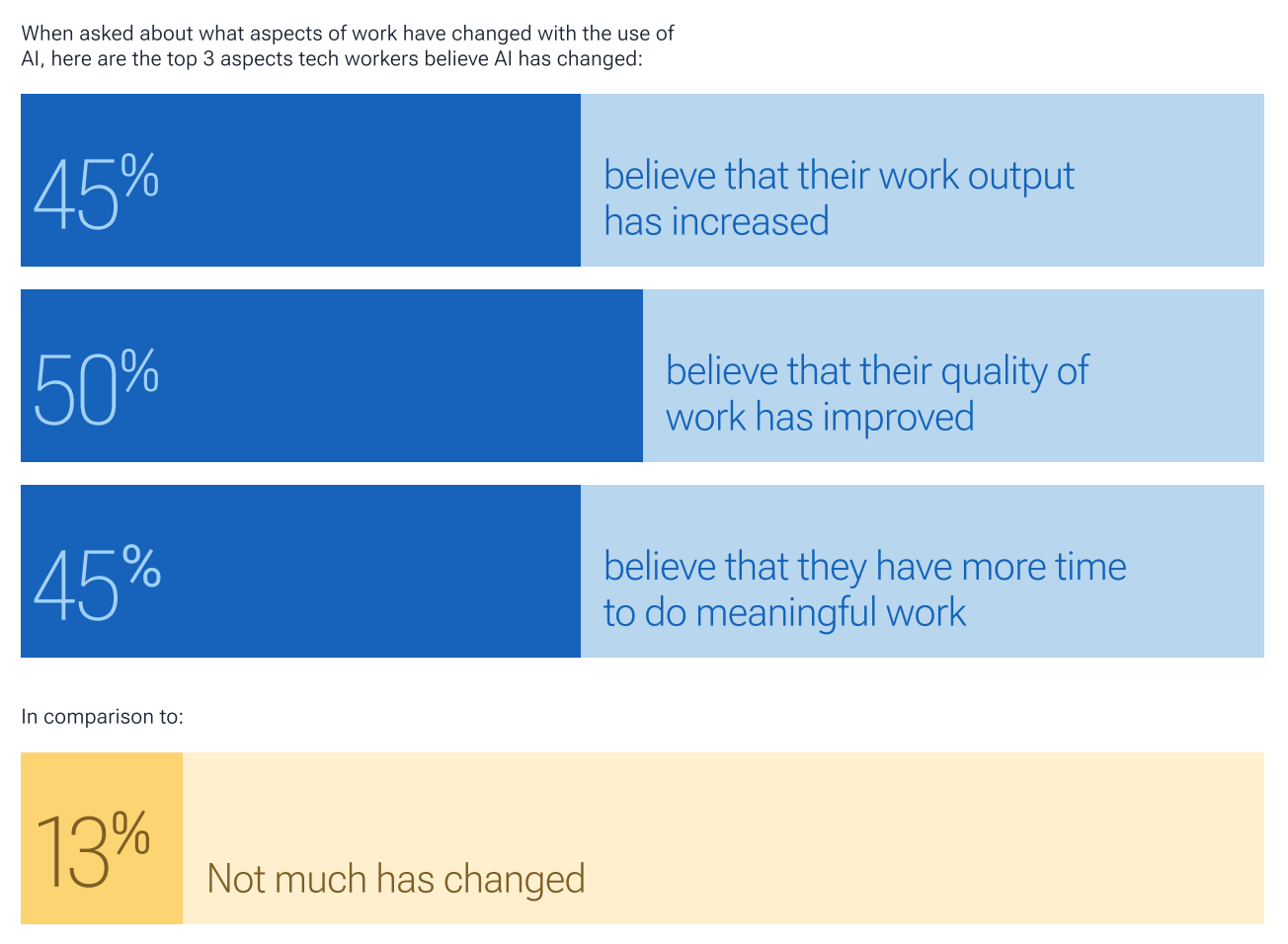
6. AI makes creatives and marketers more productive
Creatives and marketers we interviewed and surveyed report that AI enables them to do more with less time, money, and resources. Instead of investing considerable effort in exploring various directions for an ad campaign or video, for instance, AI can be used to mock up many options with minimal effort. This enables faster and more informed creative direction and decision-making with less hassle.
7. Human intervention is still needed for most jobs AI can complete
Today, human intervention, known as Human-in-the-Loop (HITL) is still needed for most jobs AI can complete. HITL trains the AI further, which could allow AI to gradually replace these HITL moments.
8. Despite ‘takeover’ fears, creatives find AI augments their abilities
Creatives and marketers report AI enables them to do more with less time, money, and resources. Instead of investing considerable effort in exploring various directions for an ad campaign or video, for instance, AI can be used to mock up many options with minimal effort. This enables faster and more informed creative direction and decision-making with less hassle.
Respondents indicated that AI gives a starting point to get over creative humps. AI helps with initial creation, but humans come in as complexity increases. The up-front process of idea generation, ideation, or inspiration is greatly assisted by AI, which shortens time frames before diving into a creative process.
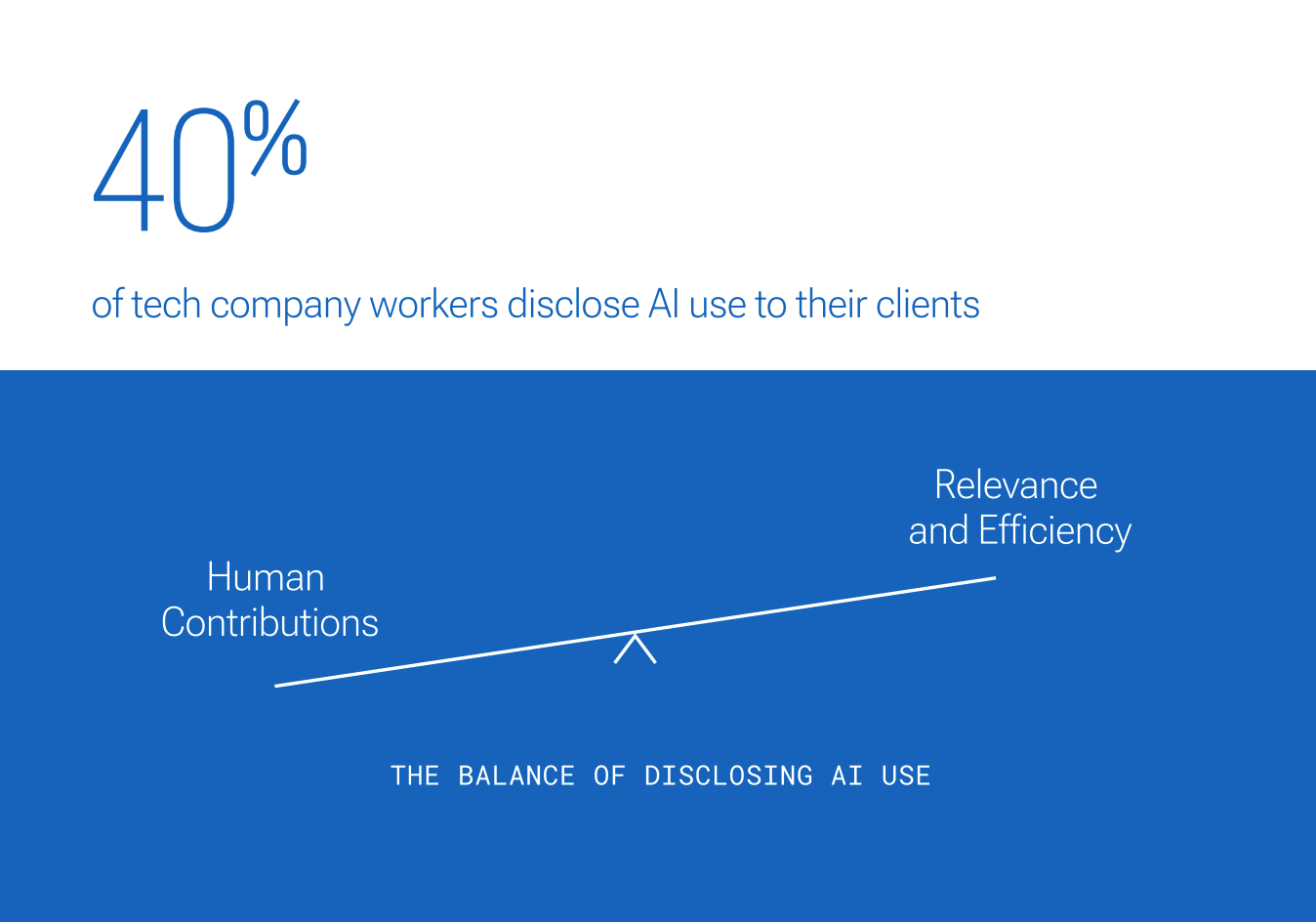
9. Professionals worry that disclosing AI use could minimize human contributions to work
Consultants and other service providers note that clients might be impressed that AI is being used…or wonder why they are paying so much for a service if machines are doing the work. Clients may also decide the tasks cannot be too complicated if AI can be used to complete them, and take the work in house. As AI becomes more widespread, disclosing its use may inspire greater confidence. The same professionals who are reluctant to disclose AI use note they would want transparency from others.
Confusion persists around explaining what ‘AI use’ means, so many professionals find it easier not to disclose it. (The market has not yet caught up.) Those who are able to quantify the advantage that comes from using AI, and have taken security measures, might be more inclined to broadcast it to clients.
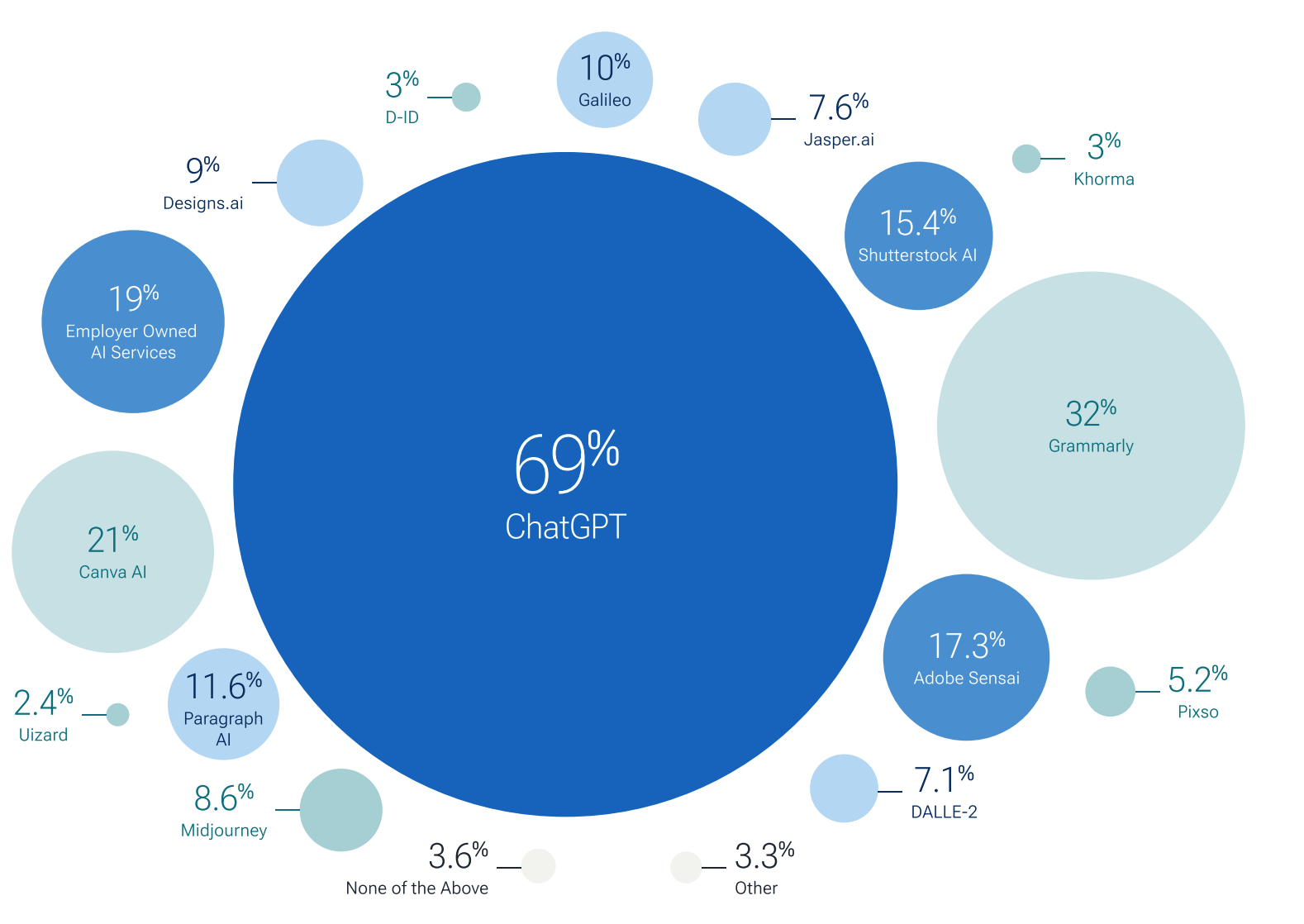
10. ChatGPT is the most important AI tool professionals use, by a large margin
OpenAI’s first-mover advantage with its large language model ChatGPT has helped to establish its adoption amongst creatives. Some 69 per cent of respondents indicate that they feel ChatGPT is the most important AI tool they use, followed by Grammarly at 32 per cent, Canva AI at 21 per cent, Adobe Sensai at 17.3 per cent, and employer-owned AI services at 19 per cent.
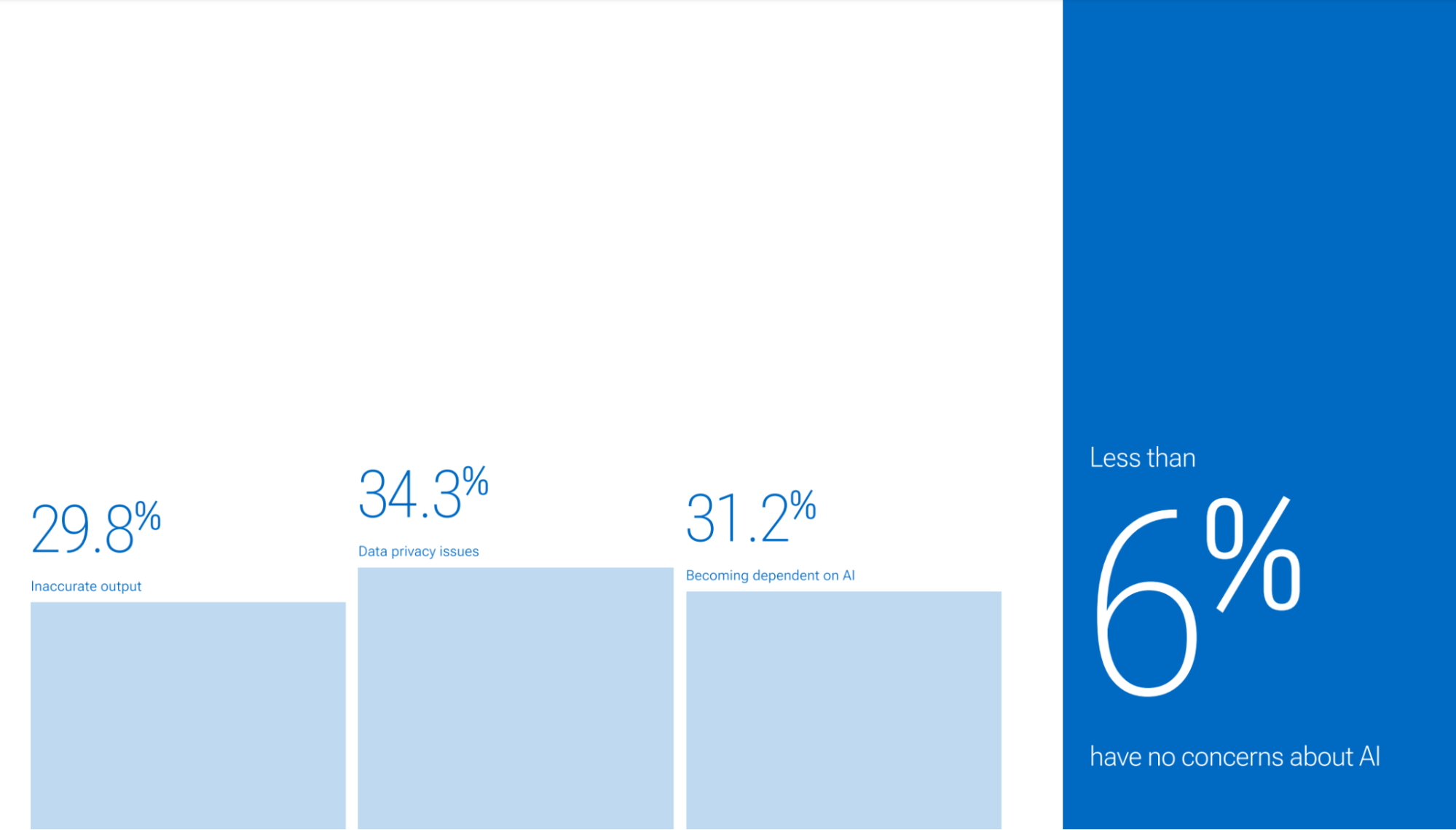
11. The majority of tech workers have concerns about AI
The top concerns tech professionals have about AI in the workplace include data privacy issues, becoming too dependent on AI, and inaccurate outputs.
12. AI affects creativity
Respondents note that instead of requiring a lifetime of training to hone skills, style, and craft, even amateurs are now able to build on top of what has already been done. Arguably, a much broader base of users are now able to create whatever they imagine with little training required.
At the same time, humans must prompt AI well in order to generate compelling creative outputs, so people trained in creative thinking still have an advantage. Our respondents also recognized ethical concerns around intellectual property that need to be considered when AI is used to generate art.
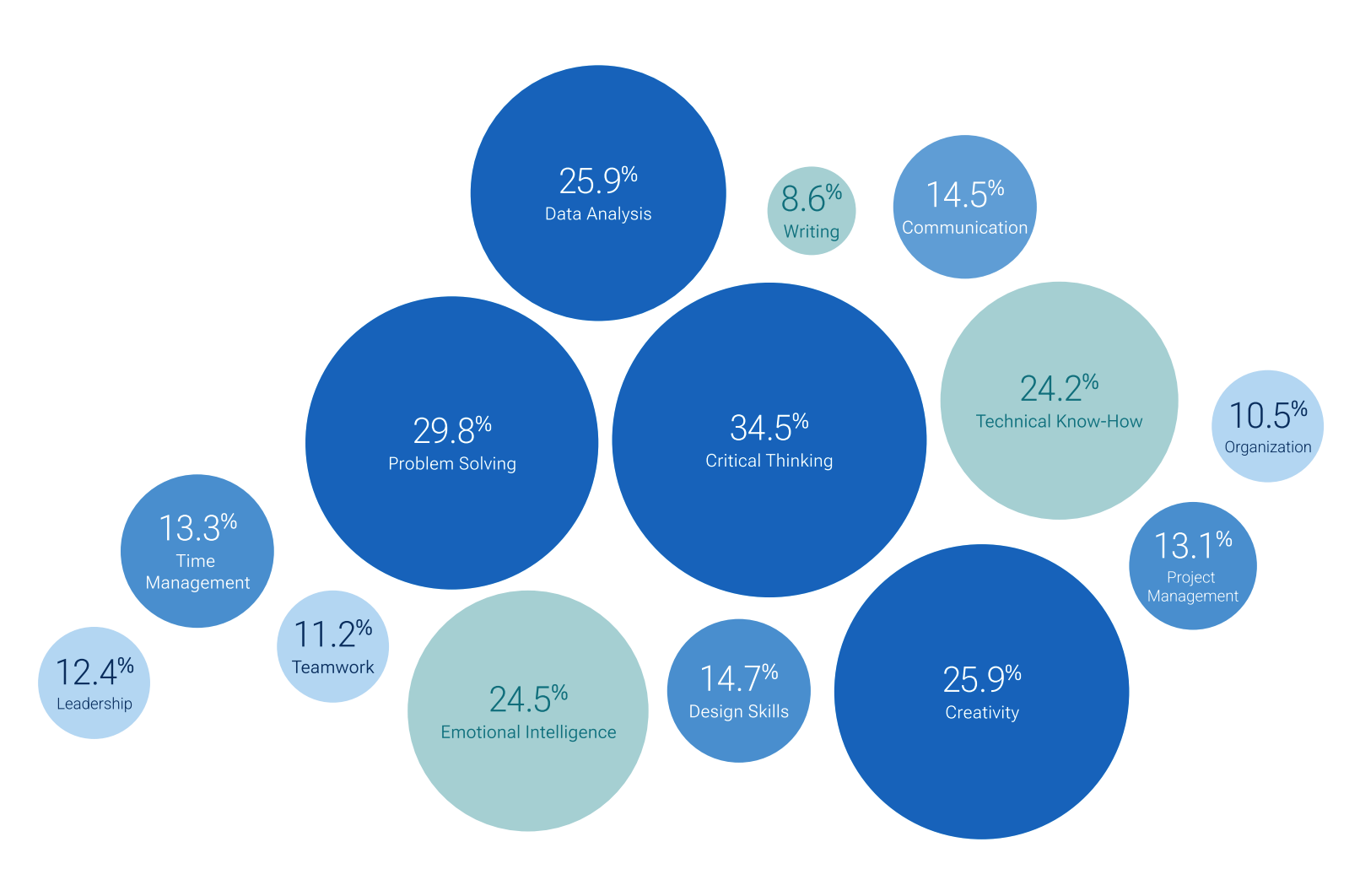
13. Critical thinking, problem solving, and creativity are top skills required for work in an AI-dominated future
Our research indicates workplaces of the future will require us to be well-rounded workers and lean into what makes us human: critical thinking, imagination, empathy, and compassion to see broadly. These human skills will be important as our jobs change; we must learn how to give good direction and recognize quality output.
“We should get ahead of this, because this isn’t going to stop. There’s so much utility with this subject matter…It’s kind of hard to not be part of this at this time.”
Final thoughts about emerging AI technologies in tech
- Overall, tech workers are both curious and optimistic about what AI can bring to the table. Concerns about AI are real and present, often wrapped up in worries about data privacy issues, inaccuracies, and becoming dependent on AI. Concerns lessen with more frequent use.
- Creatives in tech are using AI to execute tasks more frequently than those in non-creative roles, and report it strengthens their creative and innovative thinking.
- Algorithmic and data transparency is seen as an important step for AI regulation. The biggest responsibility for regulating the AI space is placed on companies that make AI tools available.
- We see democratizing effects of AI, with startups using AI more frequently and in more varied ways to expand their capabilities. Startups are more open to disclosing AI as they are more inclined to place a high value on seeming innovative.
- Humans are still needed to assess the quality of AI output. It’s increasingly crucial for organizations to provide adequate training to those in junior positions on how to identify quality outputs and contextualize them.
About the State of AI 2023 survey
Our research data is based on the results of an AI survey conducted by RBCx and distributed by Cint between June 22-26 2023, via an online panel. In total, there were 510 completed responses of Canadian technology workers (18+). No margin of error can be associated with a non-probability survey, but for comparative purposes a probability sample of this size would have a margin of error of +/- 3 per cent with a 95 per cent confidence level.
